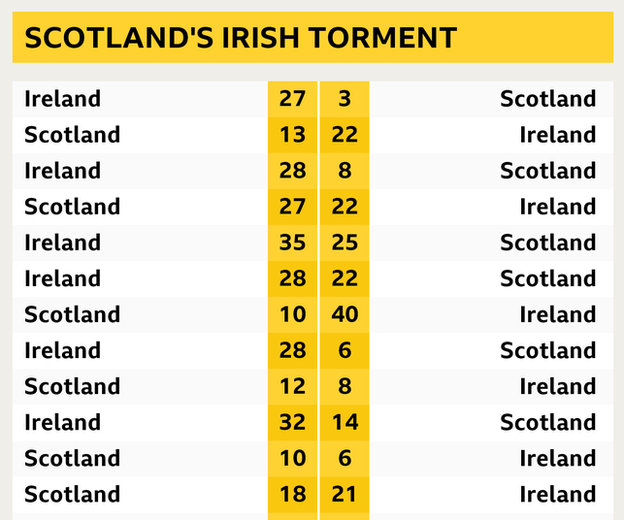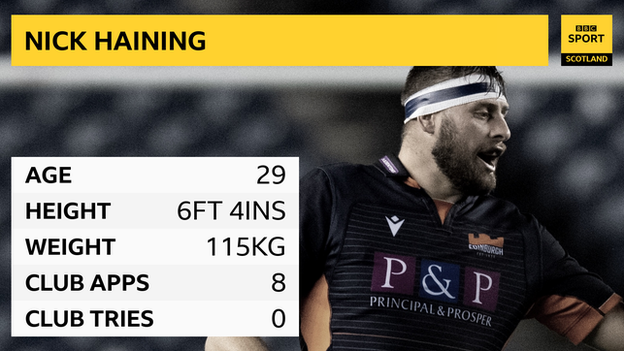Six Nations: 'Scotland must find dark side before they can see light'
- Published

Scotland have not won in Dublin since 2010
Six Nations 2020: Ireland v Scotland |
|---|
Venue: Aviva Stadium, Dublin Date: Saturday, 1 February Kick-off: 16:15 GMT |
Coverage: Listen on BBC Radio Scotland, BBC Radio 5 live extra & online; text commentary on BBC Sport website & app |
For Scotland to get a win in Dublin on Saturday, there's a list of things they must get right, a list so long that you could paper the route from Stephen's Green to Lansdowne Road with it.
First, they need to turn up, something they singularly failed to do in Yokohama when the sides last met for a game that was all but over after 26 minutes. Next, they had to get their best team on the field, a hurdle that has already been clattered rather than cleared with Finn Russell's abdication and injuries to Darcy Graham and Magnus Bradbury.
Then, defend well - a task that has proven beyond the Scots who have conceded 11 tries in their last three games against Ireland. Also, attack well - another job they've found hard to crack with only two tries scored against the Irish in three Tests in Japan, Edinburgh and Dublin.
Scotland 'deserving of our doubt'
A year ago, Ireland came to Edinburgh and won by nine points. We tend to forget the nuances of the game, but they're worth recalling.
The defensive calamity that saw a try gifted to the visitors in the first quarter; the opportunity missed when Tommy Seymour failed to spot Sam Johnson inside him not long after that; the attacking Scottish line-out on the Ireland five-metre line stolen by James Ryan; the 25 phases that Scotland went through in the Irish 22 with no return; the pass that Seymour over-ran with a free path to the try-line ahead of him; the fact that 73% of that opening 40 minutes at Murrayfield was played in Ireland's half and yet, despite all that possession and all that territory, the hosts trailed by two points.
These are the forgotten fine margins. Fifty minutes: Scotland on the front foot but the momentum is checked when Josh Strauss is done for not releasing. Fifty-five minutes: Scotland looking threatening but Russell throws a needless forward pass to Rob Harley. Fifty-six minutes: Harley and Allan Dell fall off a tackle on Joey Carbery and Ireland end up scoring in the corner.
Sixty minutes: Scotland back on the ball but Dell forces a pass to Grant Gilchrist and tempo is lost. Seventy-five minutes: Blair Kinghorn takes Scotland across halfway, but Jamie Ritchie gives away a penalty and the moment passes. Seventy-seven minutes: Seymour breaks out but forces a pass to Fraser Brown. Ireland off the hook. Seventy-eight minutes: Scotland with an attacking lineout in pursuit of a losing bonus point, but it's stolen by Ultan Dillane.
Big moments and little moments. In a nine-point game, these errors matter. And Scotland made them by the barrowload that day. They were brave, no question. They made more than 200 tackles with Strauss on 29, Gilchrist on 28, Dell and Jonny Gray on 25 and Ritchie on 23. But the ruthless streak wasn't there. The bit of class in attack, the bit of dog in defence. Ireland, poor on the day, had just about enough of both to see Scotland off.
There's no point in analysing the World Cup meeting in the same way because Scotland produced a performance that day that wasn't even distantly related to coherent rugby. Until they start putting in solid 80-minute displays, they cannot be trusted on this stage; until they rid themselves of the capacity to leak soft tries and play themselves out of games early on then they are deserving of our doubt. And they have it on Saturday. Plenty of it.
'Schmidt's biff did for Scotland'
Usually at this time of year you get your Scottish dreamers, your serial optimists who look into the middle-distance and somehow see some hope out there. Those characters are thin on the ground these days. In the real world of the Six Nations, defence - not attack - is king. Wales won a Grand Slam last season by scoring only 10 tries, the same as Italy, who finished bottom. It was the brutishness of their defence that did it. Same story the year before when Joe Schmidt's Ireland pulverised their way to a Slam.
What we do we know of Scotland's defence? They conceded 17 tries in the 2019 Six Nations, four more against Ireland in Yokohama and another four against Japan in the Test that saw them exit the World Cup. Some of those tries were unavoidable through sheer weight of pressure. Others - too many - were down to individual errors, system failures and lack of intensity. Scotland's vulnerability when defending their own line against a wave of belligerence has become wearying.

Scotland have not won in Dublin since 2010 and lost nine of the 12 matches since
The wise approach here is to believe in improvement only when it's happened and happened again and is so blindingly obvious that even the most jaded sceptic can see it. Steve Tandy is now running Scotland's defence. He hasn't had long, but we'll look for signs of his work on Saturday.
The chances are that first examination won't be long in coming. Irish rugby fans will forever love Schmidt and all that he achieved, but they're ready for something new. The attritional, relentless phase-building, the low-risk stuff that achieved success largely by grinding opponents into the ground was past its sell-by date by the time Ireland got to the World Cup. Schmidt didn't recognise it - or didn't want to recognise it - and his team failed as a result.
Andy Farrell will move away from that, little by little you suspect. He has a team that can play and battle. Schmidt's biff did for Scotland on all bar one occasion, so that physical dominance is something they'll still see as the route to victory. Farrell might want to add some bells and whistles to prove to people that he's his own man, not Joe's man.
Haining 'stepping into another world'
He has the artillery to do it. Brian O'Driscoll said during the week that the Irish pack didn't rate all that highly in the grunt factor. If that was his opinion on the Ireland eight, it would have been interesting to hear his answer if asked to pass comment on the physicality of their Scottish counterparts.
They have it, but they do they have enough of it? In Brown, Ritchie, Hamish Watson and, at his angriest best, Zander Fagerson, they have go-to men. Rory Sutherland, winning his first cap in three-and-a-half years, Scott Cummings, now starting after fine form with Glasgow, and Nick Haining, the debutant at number eight, have to make a difference. Whatever belligerence they've got, they better empty the tanks out there.
Haining is the bolter. He's 29 and has lived his professional rugby life as a journeyman, going from Western Force to Jersey Reds to Bristol to Edinburgh. After eight games for the team he joined in the summer, he is now a Test player. He comes recommended by Richard Cockerill, who likes his hard edge, and has been backed by Gregor Townsend, who has spoken about his explosiveness, his work-rate, his power.
They're drawing big conclusions from not a lot of evidence, though. Haining's debut for Edinburgh came in a 60-point win against the Kings. While the World Cup was on, he played against the Scarlets, Leinster and Cardiff Blues, who were all missing their top men. He also featured against Zebre. In the Challenge Cup, he's played against Agen twice and Wasps once.

He hasn't experienced the aggro of a game with Glasgow, gone toe-to-toe with a full-strength Leinster, Munster or Ulster, or played in either game against the French table-toppers of Bordeaux-Begles. Now he's in with the really big boys. It's not another level he's steeping into, it's another world.
We can talk about the threat that Scotland may pose if they get ball in hand, but it's the pack that will need to get them that ball. Speculating on how Adam Hastings may cope in what will be the biggest game of his life depends on the decisions he makes but, firstly, it rests on what his forwards can do for him. The effectiveness of the Scots up front is the beginning, the end and the in-between of this Test.
If Scotland concede early, and softly, then switch if off if you're at home because you'll have seen it all before. If they survive an expected onslaught through aggression and organisation and nastiness and grow from it then we'll blink hard at something new, something more resolute, something that might offer hope.
Recently, Townsend has given to talk about wanting to make Scotland "a nightmare to play against". He's right. This is a team that needs to find its dark side before it can see the light.
